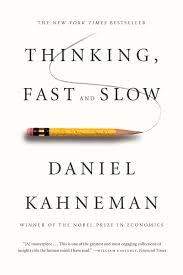 I just finished reading Thinking, Fast and Slow by Daniel Kahneman, and I absolutely loved it. I think you can tell based on the sheer quantity of notes I took, and I try to only take notes on things that are new or noteworthy for me personally (and I've read a lot of psychology and behavioral economics literature before). I think this book is the most comprehensive and clear coverage of the field I've seen to date. No wonder so many people reference it and recommend it. I found a lot of similarity in this book to Antifragile and some of Taleb's other books (and Kahneman references Taleb several times in this one). So many good ideas in here, so many interesting experiments, and such a thorough treatment of cognitive biases, rational decision-making under uncertainty, the remembering vs. experiencing self (and how memories can be manipulated), and so many other interesting topics. Intro
Origins
Part 1: 2 systems Ch 1: the characters of the story
2 attention and effort
3 the lazy controller
4 associative machine
5 cognitive ease
6 norms, surprises, and causes
7 machine for jumping to conclusions
8 how judgments happen
9 answering an easier question
Part 2 heuristics and biases 10 law of small numbers
11 anchors
12 the science of availability
13 availability, emotion, and risk
14: Tom W's speciality
15 Linda less is more
16 causes trump statistics
17 regression to the mean
18 taming intuitive predictions
Part 3 overconfidence 19 illusion of understanding
20 the illusion of validity
21 intuitions vs formulas
22 expert intuition: when can we trust it
23 outside view
24 engine of capitalism
Part 4 choices 25 bernoulli's errors
26 prospect theory
27 endowment effect
28 bad events
29 four fold pattern
30 rare events
31 risk policies
32 keeping score
33 reversals
34 frames and reality
Part 5 two selves 35 two selves
36 life as a story
37 experience well being
38 thinking about life
conclusions
0 Comments
Your comment will be posted after it is approved.
Leave a Reply. |
Archives
June 2024
Categories
All
Subscribe |
 RSS Feed
RSS Feed
